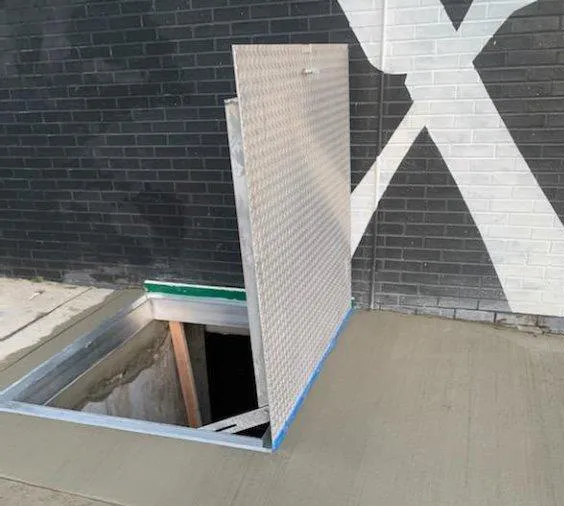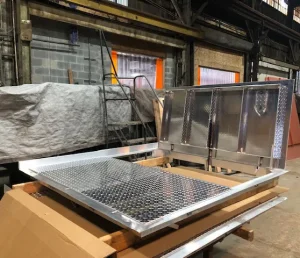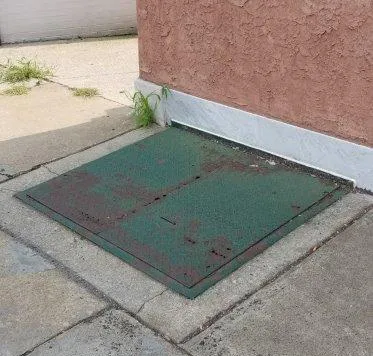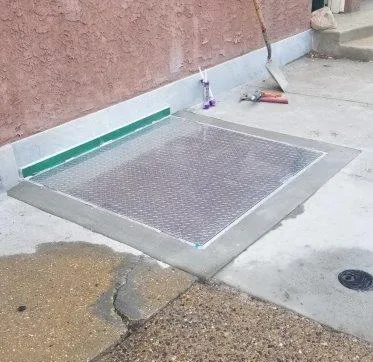
If you’re choosing sidewalk doors for a home, you’ll find two standard options: aluminum and steel. Both can be strong, secure, and code-compliant. But for most residential projects, aluminum is the wiser long-term pick. It’s lighter to operate, naturally resistant to rust, and easier to keep looking good long-term. Pair those benefits with Steelway’s proven fabrication and watertight options, and you get a door that opens smoothly and blends into your hardscape for years.
A sidewalk door is much more than a lid over an opening. It influences safety, longevity, and everyday ease of access. The right door:

Steelway’s sidewalk doors are designed and fabricated to meet municipal codes, with locking and watertight options available, which are essential fundamentals for both safety and peace of mind.
Aluminum is lighter than steel, so it’s easier to lift and use every day. Steelway can add spring or gas-piston helpers and a locking hold-open arm, so one person can open the door and keep it safely propped while they work.
Aluminum doesn’t rust. Steel can withstand outdoor conditions, but it requires protective coatings (such as galvanizing) and regular maintenance. With aluminum, plus corrosion-resistant hardware and gasketed seals, maintenance stays simple and the door keeps looking good, especially in wet or salty areas. Steelway designs its aluminum sidewalk doors for durability, easy maintenance, and smooth everyday use, making it simple for people and equipment to move in and out.
Built as a Water-Management System
A good sidewalk door is more than a lid; it’s a whole system. Steelway adds gaskets around the frame and a built-in drain connection, so your installer can pipe water to a dry well or drain line. If you need extra protection, there are watertight options too. For homeowners, this design keeps the space below dry, clean, and usable.
Just because aluminum doors are lighter doesn’t mean they’re weak. At Steelway, we build them to meet code and handle the weight of people walking on them, which is more than enough strength for home walkways, patios, and everyday use.
Because aluminum doesn’t rust and generally needs fewer repaint cycles, it keeps a cleaner look with less upkeep. Steelway’s aluminum sidewalk doors also offer locking options and smooth operation features that make day-to-day access easy.
If you want a door that’s easy to use, low-maintenance, and built to handle real life at home, aluminum checks all the boxes.
While aluminum sidewalk doors were originally (and still are) designed for commercial use, we find that steel is often a better fit for these commercial applications. Why? Because steel is tough, and in busy commercial areas (like stores or restaurants) where doors take a beating from carts, equipment, and impacts, steel’s extra weight and stiffness are a plus.
Steelway’s diamond-plate and galvanized steel sidewalk doors are made precisely for this kind of heavy use. Or, in instances where the weather is harsh or maintenance will be rare, galvanized steel lasts even longer.
Getting the install right keeps your space dry, safe, and easy to use. Here’s what to focus on:
Plan the drain path.
Use the built-in drain coupling and pipe it to a dry well or drain line. This simple step prevents water from ending up in your basement.
Match the material to your climate.
For most homes, especially coastal or snowy areas, aluminum with corrosion-resistant hardware is the low-maintenance choice. For tougher, commercial-style use, consider a custom steel application.
Add lift assists.
Springs or gas pistons, plus a locking hold-open arm, make the door safer and easier for anyone to open and keep securely propped.
Don’t overbuild.
If vehicles won’t drive over the door, a pedestrian-rated aluminum model is perfect. Save heavy-duty specs for spaces that truly need them.
What Steelway Brings to the Table
Regardless of material, Steelway focuses on making sidewalk doors that are code-compliant, traffic-rated, and tailored to the opening. They’ve been fabricating in the U.S. since 1963, and they provide both stock sizes and laser-cut custom fabrication for unique footprints or replacements, which is handy when you’re retrofitting an older property. They also call out a growing trend: homeowners replacing angled bulkhead doors with in-ground sidewalk doors to reclaim usable space in the yard.
Ease of use
Weather and corrosion
Strength and loads
Maintenance
Both materials can be made code-compliant and traffic-rated, but aluminum’s lighter weight, no-rust benefit, and lower upkeep make it the better fit for most homes.
Before

After

For most homes, aluminum is the smart long-term pick. It’s lighter to use, won’t rust, and needs less upkeep, especially with gasketed frames, drain hookups, and secure locking options. Steel is still an excellent choice for commercial or high-abuse areas where carts, equipment, or impacts are standard (like diamond-plate or galvanized models).
At Steelway, we build both, and we build them right. Since 1963, we’ve engineered doors to meet municipal codes and pedestrian loads, with in-stock sizes and custom, laser-cut options so you get a perfect fit.
Get started in three quick steps:
Reach out now to get a tailored recommendation, pricing, and timeline. Let’s pick the door that fits your home. Contact us today.